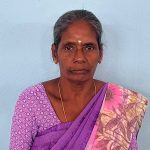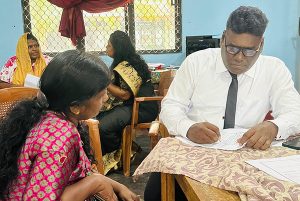
Kantale, Sri Lanka – For 35 heart-wrenching years, Nagamma, now 67, has lived with a single question: What happened to my family? Yesterday (17th), her story came to light during a legal aid program in Kantale’s Peraru village, shedding light on decades of unresolved disappearances and the unrelenting struggle for justice.
Nagamma’s husband, Sokkalingam, and her five children, four sons and one daughter vanished on July 8, 1990. At the time, Nagamma was abroad. The last piece of communication she received was a letter from her husband, written a month before the disappearance. In it, he described the worsening security situation and the family’s decision to move to a safer place. That letter was the final trace of her family.
Upon returning to Sri Lanka, Nagamma sought help through the Morawewa Police and other authorities, but her desperate search for answers yielded nothing. Today, three and a half decades later, justice remains elusive, as do the whereabouts of her loved ones.
This tragic story was one of many shared at the legal aid program organized by the Right to Life Human Rights Center and the Kantale Human Rights First Aid Center—the program aimed to support families of the disappeared and victims of extrajudicial killings. Many families came forward for the first time to seek legal advice and assistance in filing complaints with the Office on Missing Persons and other relevant government bodies.
“This is about more than one family’s tragedy. It’s about the rights of every Sri Lankan citizen to know the truth, to demand accountability, and to receive justice,” said attorney Thilakaratnam Tusyanthan, who was among the legal advisors at the program.

Lawyers, journalists, and human rights activists, including attorney Lakshmi Susikumar, provided guidance to families on preparing necessary documents and navigating the complex processes required to pursue their cases.
The program highlighted the pervasive issue of unresolved disappearances in Sri Lanka, where thousands of families like Nagamma’s continue to suffer in silence, denied answers or closure.
Nagamma’s story is a stark reminder of the lasting wounds inflicted by enforced disappearances. Her search for justice is not just a personal journey—it is a fight for the fundamental rights of all families of the disappeared. As Nagamma herself said, “I will not stop seeking the truth, no matter how long it takes. Every family deserves to know what happened to their loved ones.”
The need for action is urgent. Justice delayed is justice denied. Families like Nagamma’s must no longer be ignored—they deserve answers, accountability, and the right to heal.
